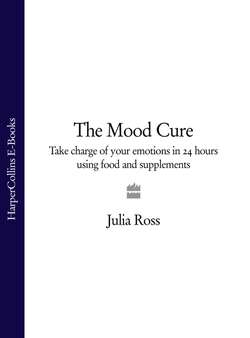Читать книгу The Mood Cure: Take Charge of Your Emotions in 24 Hours Using Food and Supplements - Julia Ross - Страница 80
Do You Have These Symptoms of Low Thyroid Function?
ОглавлениеTake a moment to scan the following list to see if you identify with these symptoms. Depression is only one of the many negative effects that you may be facing if your thyroid is malfunctioning.
Common symptoms of low thyroid function:
Low energy, fatigue, lethargy, need lots of sleep (more than eight hours), trouble getting up and going in the morning
Depression (including postpartum or after the start of menstruation or menopause)
Tendency to feel cold, particularly in hands and feet
Poor concentration and memory, mental sluggishness
Family history of thyroid problems
As a child, played quietly rather than physically and/or now have trouble getting exercise without a guilt trip
Weight gain began when you got your period, had a miscarriage or an abortion, gave birth, began menopause, or worsened after low-calorie dieting
Chubby or overweight since childhood
Tendency to excessive weight gain or inability to lose weight despite normal eating
Hoarseness, gravelly voice
Low blood pressure/heart rate
Menstrual problems, including excessive bleeding, severe cramping, irregular periods, severe PMS, scanty flow; early or late onset of first period (before 12 or after 14 years old); premenopausal cessation of menstruation (amenorrhea)
Reduced sexual drive
Swollen eyelids and face, general water retention
Thinning or loss of outside eyebrow hair
Tendency to have a low temperature
Headaches (including migraines)
High cholesterol, atherosclerosis, or excessive homocysteine
Lump in throat, trouble swallowing pills
Slow body movement or speech
Additional possible symptoms:
Goiter; enlarged, swollen, or lumpy thyroid (look at the base of your throat, under your Adam’s apple and above your sternum)
Coarse, dry hair
Bulging eyes
Infertility, impotence
Weak, brittle nails
Anemia, low red cell count
Adult acne, eczema
Dry, coarse, or thick skin
Pale skin
Hypoglycemia
Constipation
Hair loss
Labored, difficult breathing
Swollen feet
Nervousness, anxiety, panic
Enlarged heart
Premature graying
Gallbladder pain
Pain in joints
Autoimmune conditions often associated with thyroiditis: diabetes, rheumatoid arthritis, multiple sclerosis, lupus, Addison’s disease, allergy, Candida overgrowth, and pernicious anemia
Angina, heart palpitations, irregular heartbeat
Muscle weakness
Atherosclerosis
Extreme flexibility (double-jointed)
Strong-smelling urine
Tongue feels thick
Vision, eye problems
Excess earwax
Checking off your symptoms on this list is a solid start. But go beyond it to make an even stronger case. Ask yourself, “When did my symptoms begin? What illnesses or upsets was I experiencing at that time? Have my symptoms always been there?”
Quite a few of our clients report the start of symptoms after a tonsillectomy (the tonsils are close to the thyroid). The start of menstruation, menopause, or a pregnancy is perhaps the most common trigger in women, but the incidence of thyroid problems among women doubles after menopause, and up to 30 percent of women with PMS have some kind of thyroid problem. Among men, the rates of thyroid dysfunction climb steeply after age 60, but we’ve seen many younger men with thyroid malaise, often starting with unusual weight gain in childhood. Most of our low-thyroid female clients began to gain unneeded weight and lose needed vitality in puberty.
If you’ve found that you have many of the symptoms on the list above, check them off and take the list to show to your physician. Thyroid malfunction is easily overlooked by many doctors, who simply run a single test, read the results with outdated reference ranges, ignore the symptoms thoroughly, and tell you to see a therapist or a diet doctor. For this reason, I recommend a very specific strategy for demanding attention for your thyroid. Otherwise you may never get any. I detail this technical strategy, from finding an effective doctor to testing your thyroid, to successful treatment, in the “Thyroid Tool Kit,” page 306.
